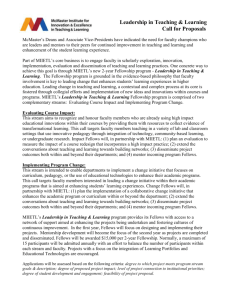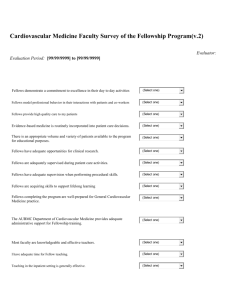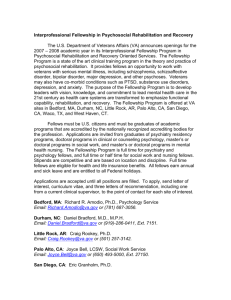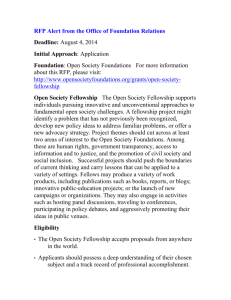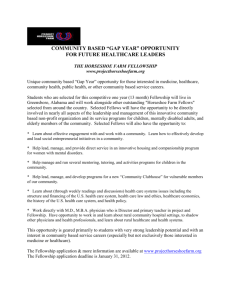our constitution here - West African Health Informatics Fellowship
advertisement
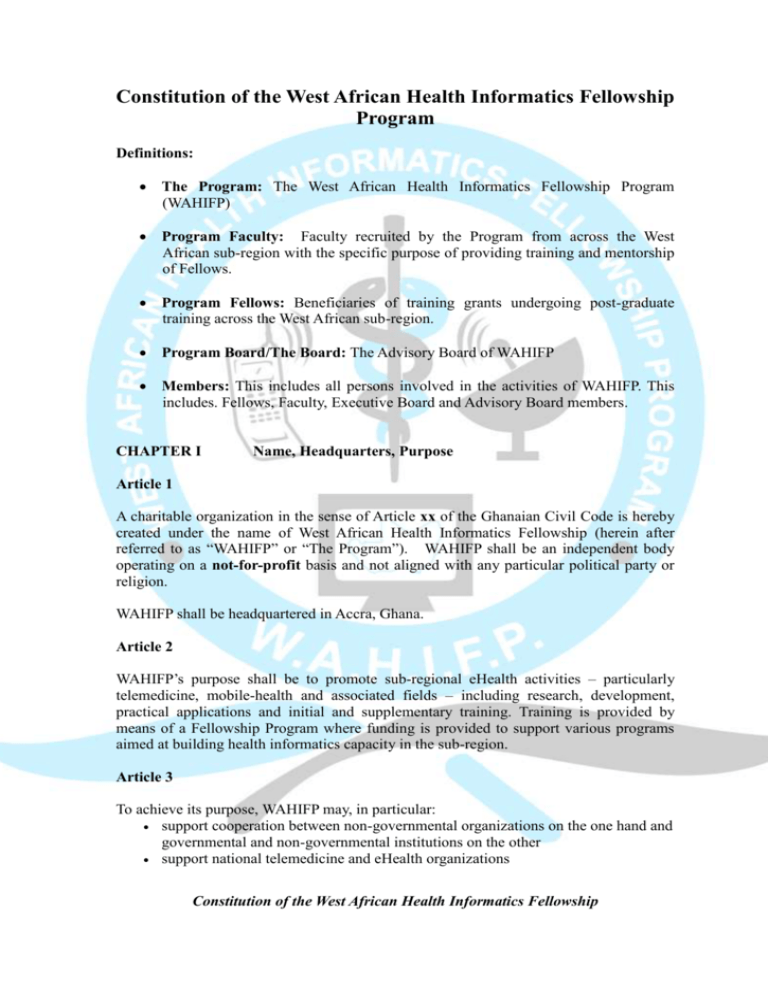
Constitution of the West African Health Informatics Fellowship Program Definitions: The Program: The West African Health Informatics Fellowship Program (WAHIFP) Program Faculty: Faculty recruited by the Program from across the West African sub-region with the specific purpose of providing training and mentorship of Fellows. Program Fellows: Beneficiaries of training grants undergoing post-graduate training across the West African sub-region. Program Board/The Board: The Advisory Board of WAHIFP Members: This includes all persons involved in the activities of WAHIFP. This includes. Fellows, Faculty, Executive Board and Advisory Board members. CHAPTER I Name, Headquarters, Purpose Article 1 A charitable organization in the sense of Article xx of the Ghanaian Civil Code is hereby created under the name of West African Health Informatics Fellowship (herein after referred to as “WAHIFP” or “The Program”). WAHIFP shall be an independent body operating on a not-for-profit basis and not aligned with any particular political party or religion. WAHIFP shall be headquartered in Accra, Ghana. Article 2 WAHIFP’s purpose shall be to promote sub-regional eHealth activities – particularly telemedicine, mobile-health and associated fields – including research, development, practical applications and initial and supplementary training. Training is provided by means of a Fellowship Program where funding is provided to support various programs aimed at building health informatics capacity in the sub-region. Article 3 To achieve its purpose, WAHIFP may, in particular: support cooperation between non-governmental organizations on the one hand and governmental and non-governmental institutions on the other support national telemedicine and eHealth organizations Constitution of the West African Health Informatics Fellowship promote the cause of telemedicine and eHealth within the country, as well as with international institutions or organizations contribute to the dissemination and exchange of knowledge, information and technologies relating to eHealth applications promote initial and supplementary theoretical and practical training in the field of telemedicine mhealth and eHealth, including its applications throughout the health sector regardless of professional or geographical limits support daily activities relating to eHealth research and development and its application bring together eHealth users, scientists and researchers and sponsors, advisers and manufacturers and distributors and their scientific personnel promote the formulation and publication of rules for good practice and also guidelines and information on such practice support activities relating to the establishment of appropriate legal and regulatory frameworks for telemedicine and eHealth applications. CHAPTER II Membership Article 4 The society shall consist of institutional members (institutions), non-governmental institutions (NGOs) corporate members (corporates) from within the West African subregion and beyond. Institutional members shall be not-for-profit governmental and non-governmental institutions such as universities, clinics, hospitals, healthcare training institutions, research institutes and their sponsoring organizations. Corporate members shall be commercial organizations such as manufacturers, distributors and service providers in the field of eHealth. There individual membership. This includes: 1. Members of the Advisory Board (including Honorary Members) 2. Fellows and Premium Candidates 3. WAHIFP Faculty Membership of the Advisory Board is by invitation only. This includes Honorary Membership. Tenure on the Advisory Board is for two years. It is renewable with no limit on the number of terms served for as long as the Executive Committee deems it fit to consider an extension to such tenure. The Executive Committee of the WAHIFP shall accept and classify members in accordance with its own fair judgment. Appointment to the Advisory Board is by invitation only The Executive Committee shall rule on the exclusion of a member of the Advisory Board. Constitution of the West African Health Informatics Fellowship In case of good cause for an exclusion relating to the behavior or character of a member, the Executive Committee shall rule on the exclusion. CHAPTER III Organs Of WAHIFP Article 5 The organs of the association shall be: a) The Executive Committee b) The Advisory Board without restriction on where they live or work Article 6 The ordinary General Assembly shall be held once a year. Extraordinary General Assemblies may be convened by the Executive Committee or if a fifth of the members request this whilst specifying their purposes for doing so. The Executive Committee shall issue written invitations to attend the General Assembly with at least ?60 days’ notice and indicating the General Assembly’s agenda. The Executive Committee shall be notified in writing at least ?30 days prior to a General Assembly of motions submitted by members on which the General Assembly is to vote. Members unable to attend may also vote on motions by means of a suitable form of telecommunication. They may cast their votes by telephone, facsimile, email or other suitable means. The meeting’s chairperson must take into account all votes for which there is no reasonable doubt as to the identity of the sender. At least two-thirds of the individual members’ votes shall be required in order to amend the statutes of the society. Article 7 Executive Committee Structure Each member of the Executive Committee shall have one vote. The Executive Committee shall appoint from amongst its members: 1. 2. 3. 4. 5. A president A Program Coordinator A Deputy Program Coordinator, Academic Programs Lead A treasurer It will also appoint further officers if it considers these necessary. The Executive Committee shall indicate competences and responsibilities whilst making these appointments. The Executive Committee shall formulate rules of procedure for itself. The Executive Committee shall take key decisions in a collegiate organ. Constitution of the West African Health Informatics Fellowship The Executive Committee may invite individuals as co-opted Executive Committee members by virtue of their skills and expertise in the field of eHealth. Co-opted members have no voting right in the Executive Committee meetings. Article 9 The Executive Committee shall be responsible for conducting all such business of WAHIFP as is not assigned to another organ in accordance with these statutes. In particular, it shall be responsible for implementing the Program’s purpose and associated financial and strategic decisions and activities. It shall notify the members of these in an appropriate manner and carry out appropriate public relations activities. The Executive Committee may establish the following and other committees. Projects Committee Finance & Accounting Academic Affairs/ Educational Committee The Program Coordinator has overall responsibility for the smooth day-to-day running of WAHIFP. He may delegate some responsibilities to other committee members as appropriate. The Executive Committee shall, as a rule, organize an international scientific conference once a year. WAHIFP commits itself to organize or co-organize, once a year, an event specifically directed to the practical applications in the field of eHealth. The Executive Committee shall be responsible for conducting this activity. The Executive Committee shall also establish a list of WAHIFP supported events during a working year, which will be promoted as such on its website and through its newsletters. Article 10 An advisory Board of up to 20 members consisting of prominent individuals shall be appointed to support and guide the WAHIFP as well as resolve difficult conflicts arising. They shall only have an advisory role and have no voting rights CHAPTER IV Fellows & Fellowships Guiding Principles: 1. The Fellowship Program has the potential of attracting academics seeking positions, who will want to fill various posts and eventually converting the Program a systematized tyrannical and monstrous regime that will stifle the aspirations of young Fellows and defeat the objectives of the. It is thereof important to protect it from such risks. The Program will therefore be put in the Constitution of the West African Health Informatics Fellowship checks and balances to protect the young careers of Fellows. It will be run ‘by the fellows for the fellows’. Transparency will be encouraged at every level. Qualification and selection should be by merit and not ‘whom you know’. 2. Emphasis will be on supporting fellows to complete their training and not allow them to be frustrated by people with vested interests in Fellows not graduating. It is very common in African universities to have PhD students still struggling to finish, seven years after starting full-time PhD programs meant to last for 4yeays. In the end some of them get frustrated and drop out. 3. But in West Africa, the need for health informaticians is such that large numbers are needed in various aspects of health informatics to tackle the various problems. Therefore the Fellowship Program will be run along the lines of a competitive market, where the Program Faculty provide the service of training and mentoring Fellows; and the Program purchases the service provided by the recruited Program Faculty. It will be the Fellows themselves who will determine on behalf of the Program whether good value for money is being provided by each individual Program Faculty. Article 11 The Fellowship Program and the Fellows will be the main vehicle by which to make use of the materials made available by the Health Informatics Building Blocks Project (HIBBs) to introduce health informatics early in the training of doctors, nurses, midwives and allied health professionals. Article 12 The Program shall recruit faculty from both industry and academia from within West Africa and beyond to provide mentorship and training for its Fellows. Provision of training will be regarded as a service being provided by the Faculty based on their expertise and experience Article 13 Prospective faculty will have to apply to the Program to be recruited as Program Faculty. Appointment as a Program Faculty is not automatic. It will by an interview process by a panel consisting of: A Board Member, Program Coordinator One Fellow One Independent Member appointed by the Board. The Fellow on the selection panel shall retain a veto over Program Faculty appointments. Constitution of the West African Health Informatics Fellowship Qualification for selection for interview or the position of Program Faculty will depend on 4 references from students from applicants own home faculty, if not training Fellows but if there are Fellows under his/her care, at least one of them will have to give a reference. Interviews for Program Faculty will be held once in a year. Appointment as a Program Faculty will be valid for 5years but renewable based on the recommendation of Fellows and/or students from one’s own university. To encourage collaboration, program faculty can run projects but collaborative projects will take precedence over single investigator projects in the approval process There is no limit to the number of projects a Program Faculty member will be involved in. But the value of each individual project will be directly proportional to the combined total number of fellows being mentored by the investigators. Generally, advisory board membership shall be not be open to the Program Faculty rather unless recommended by the board, they will be represented on the Program Board by a Rep. The Program will run 5-7yr Split-Site PhD Programs in Health Informatics in collaboration with various local universities within the Program and a consortium of international institutions led by the Centre for Public Health Informatics, University of Washington. The membership sub-regional and international consortia will vary. Research institutions within the West African sub-region can apply to participate in the Program in order to train help train their PhDs. Applicants for fellowships will be selected during a selection interview by a panel chosen by the Board. Local institutions can recommend one applicant per annum up a maximum total of four Fellows over a 10year period. Institutional Fellows i.e. Fellows recommended to the selection panel will have to have been guaranteed job throughout the duration of the fellowships to facilitate their training. Their salaries will be paid by the fellowship as well as other training costs including tuition fees, conference fees etc. Independent applicants can also apply but they will be required to find a mentor within the sub-region, who already registered as a Program Faculty during the application process. Constitution of the West African Health Informatics Fellowship Each Fellow will have two supervisors; one international, the other from the local institution of their mentor. Fellows will be attached to teaching hospitals and various local healthcare training institutions within their localities where they will be involved in training medical, nursing and allied health professionals. Fellows will be at the forefront for gradual introduction of health informatics into the curricula of medical schools and nursing training colleges etc by the supported by the HIBBs Program. Funding for the fellowships will automatically lapse after seven years. It is the responsibility of the Fellow and his supervisors to ensure that various milestones during the training are attained on time. CHAPTER V Premium Candidacy & Fellowships (Masters/PhD level) Article 14 Occasionally, WAHIFP will advertise for Premium Candidates. This will be the case when WAHIFP has identified a need for certain skills which demands advanced training within the PhD program, or undertaking a project felt to be particularly promising hence needs support, but there is no funding available at the time. Premium candidate (after passing the assessment and selection interview) will be supported by WAHIFP with references etc or have their names forwarded to potential funding bodies for priority assistance. The criteria for premium candidacy during any one round of selection will vary from time to time and will be determined by the Advisory Board upon recommendation by the Coordinator. ‘Premium Candidacy’ is WAHIFP’s way of saying ‘The sub-region needs this person and their project badly, but we do not have funding for his/her PhD or project, we undertake to support them in whatever way possible to find financial assistance’. Premium Candidacy is NOT an undertaking to provide funding. It is an undertaking to provide recommendations and support for a particular candidate to seek funding. While they are waiting, Premium Candidates will be in front of the queue when funding becomes available to WAHIFP. CHAPTER VI Formation Of Health Informatics Departments Constitution of the West African Health Informatics Fellowship Article 15 Multi-disciplinary Health Informatics Departments will be supported by the Fellowship once their are at least two fellows who have successfully passed the viva stage of their PhD training by which time, students have already been involved in the gradual introduction of health informatics in their local institutions. CHAPTER VII Vote of No Confidence Article 16 A motion for vote of No Confidence shall be passed on any or all members of the executive, including members of the Advisory Board, by a majority of 70 percent. Article 17 A No Confidence motion shall be tabled by any member once supported by at least 20 percent of members, on any or all members of the executive is/are deemed unfit to continue to hold office by reason of incompetence, serious misdemeanours or any other action that is regarded as posing a threat to the integrity and reputation of WAHIFP. CHAPTER VIII National WAHIFP Chapters Article 18 The association shall support the formation of Chapters in each country in West Africa. Article 19 National Chapters shall be subject to the provisions of the constitution of WAHIFP. National Chapters shall only be inaugurated at annual Conférence of WAHIFP. Article 20 The National Chapters shall consist of at least one Country Representative and executive commitee members and be semi-autonomous in existence. They CANNOT plan to raise funds, without express approval from WAHIFP central office. But they can plan and execute projects with the advice and support of WAHIFP. Their financial accounts shall be subject to scrutiny by WAHIFP. Constitution of the West African Health Informatics Fellowship Article 21 There shall be quarterly reports on the activities of each Chapter to the national executive. Failure to sent two consecutive quarterly report shall constitute a serious misdemeanour with an automatic vote of no confidence. CHAPTER IX Projects And Project Ownership Article 22 The national Chapters shall be the project owners of the specific project being implemented by the WAHIFP. It implies the national Chapter shall control the budget for the specific part of the project in their country and be expected to take the lead in the implementation. Overall guidance and supervision of the project shall be underaken by the WAHIFP Project Committee. The Project Committee shall only run project-budgets in cases where projects uniformly span national boundaries such that it is impossible to identify the relevant project owner. CHAPTER X Finances, Liability, Liquidation Article 23 WAHIFP shall finance its activities through, donations, and other gifts and from the proceeds of events. Article 24 WAHIFP’s financial commitments shall be covered by the Program’s assets alone. The members’ liability shall be excluded. Article 25 In the event of WAHIFP being dissolved, following its liquidation its assets shall be transferred to a charitable organization whose purpose is as close as possible to that of the WAHIFP. Such a beneficiary charitable organization cannot be one in which any current member of the Executive Committee is a member. CHAPTER XI Conflict Resolution Misdemeanors & Sanctions Constitution of the West African Health Informatics Fellowship Article 26 All conflicts whether they arise between members of the association or between the members and any other organ of the association or between the organs of the association themselves shall be resolved by an ad-hoc Complaints Committee appointed by the president. Where a resolution by the Complaints Committee has not been possible, the matter will be referred to the Advisory Board of WAHIFP for resolution. Article 27 Any member or officer of the association shall be subject to sanctions for any misdemeanor. A misdemeanor shall be defined as any action which is deemed by the members of the association to bring the association, any of its organs or any of its members into disrepute. The nature of such sanctionable acts shall be determined by the members. Article 28 Establishment of what constitutes a misdemeanor shall be determined by simple majority. Definition of misdemeanors can happen retrospectively, as an ad hoc decision even after the action is already committed. All that is required is The Executive Committees’ agreement on the misdemeanor. Article 29 Sanctions for misdemeanors shall include: Either a one-off payment of a fine or loss of earnings the amount to be determined by the Executive Committee or suspension from office for an appropriate period. Article 30 Actions attracting automatic sanction shall include: Misappropriation of funds belonging to the association including any of its Chapters Soliciting funds on behalf of the association without a mandate or approval of the Executive Committee Using WAHIFP’s assets for personal gain. Failure to comprehensively investigate a complaint to the satisfaction of the complainant. Intentionally fabricating a malicious complaint against an Executive Committee or Constitution of the West African Health Informatics Fellowship Advisory Board member. Article 31 A member who reports a misdemeanor for further investigation can chose to request to remain anonymous during investigations after identifying him/herself while filing the complaint. Complete anonymity at the time of complaint invalidates the complaint. Article 32 Any member shall request, in writing, for further investigations, any action deemed by that member as constituting a potential misdemeanor that brings or threaten to bring WAHIFP into disrepute. Article 33 Misdemeanors of a criminal nature shall be referred to the police for further action CHAPTER XII Concluding Provision Article 34 These statutes were approved at the constituent Advisory Board held on xx of yy 2011 Accra. List of founding members 1. 2. 3. 4. 5. 6. Dr Julius Awakame:– Founder/Program Coordinator Eric Dzade :– Co-founder/ Deputy Program Coordinator Prof Sherrillynne Fuller:– Co-Founder/Academic Programs Lead Prof Kayode Odusote – Co-Founder/President Dr Ime Asangansi:– Co-Founder/Nigeria Representative Dorothy Gordon:– Co-Founder/Treasurer Constitution of the West African Health Informatics Fellowship


